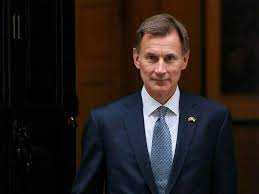Jeremy Hunt says UK must break out of tax rise ‘vicious circle’

London: Chancellor Jeremy Hunt has said he wants to stop the “vicious circle of ever-rising taxes” by reforming public services and the benefits system.
His comments come on the eve of the Conservative Party conference, as some Tories are set to call for tax cuts.
More than 30 MPs, including Liz Truss and Dame Priti Patel, have ruled out voting for any plans that result in higher overall taxes.
But Mr Hunt told the Times he could not talk about tax cuts in the short term.
On Friday, a leading economic research group said taxation levels were at their highest for 70 years, and were unlikely to come down.
‘Unsustainable taxation’
Speaking to the newspaper ahead of the conference, which begins on Sunday in Manchester, Mr Hunt said: “We need a state that doesn’t just deliver the services it currently delivers, but actually improves the services it delivers and recognises that there’s going to be more calls on those services with an ageing population.
“But we need to find a formula that doesn’t mean that we’re on a vicious circle of ever-rising taxes.”
He pointed to the role of artificial intelligence and efforts to reduce the clerical workload of public sector staff as ways to increase efficiency in services.
Mr Hunt has already effectively ruled out tax cuts in the Autumn Statement, which is due in November, telling LBC radio earlier this month that it would be “virtually impossible”.
Meanwhile, a group of Tory MPs has signed a public pledge to their constituents that they will “never again vote for an increase in overall taxes”.
As well as former Prime Minister Ms Truss and ex-Home Secretary Dame Priti Patel the signatories include former ministers Sir Jacob Rees-Mogg, Sir Jake Berry, and Sir Brandon Lewis.
Dame Priti said: “State spending is now nearly £1.2tn, with over £1tn being raised in taxes. This level of spending, borrowing and taxation is unsustainable.
“The British people need a tax break – we need to trust people and businesses to keep more of what they earn and spend their money to support themselves and economic growth.”
The report by the Institute for Fiscal Studies (IFS) said tax levels in the UK were higher now than at any point since records began 70 years ago.
It calculated this Parliament was on course to have presided over the biggest set of rises since World War Two, with taxes forecast to be up by 37% by the time of the next general election.
The IFS said the increase amounted to around £3,500 more per household.
Its director Paul Johnson said: “If you look into the future, we are going to be spending more on pensions and health and so on as the population ages.
“In my view, this is almost certainly a permanent increase in taxes.”





